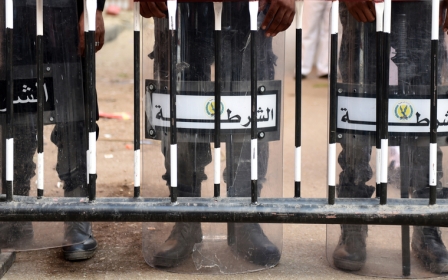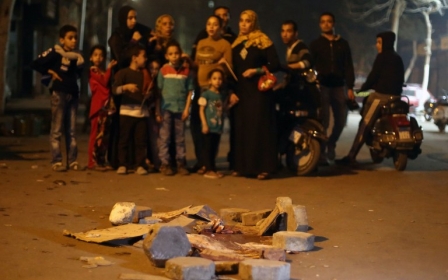Why is Sisi so afraid of Egypt’s police?

Faced with a growing number of scandals, leaks and social media revelations from Egypt’s police ranks, the government of Abdel Fattah al-Sisi has brought in a new law to silence and discipline the police.
The Egyptian parliament, packed with Sisi supporters, recently passed a controversial law barring police from speaking to the media or disseminating any information related to their work to the public.
The law also banned policemen from forming any independent movements, unions and associations of any form and from organising protests or strikes. To absorb the public discontent from the police’s rising abuses, the law also demanded police respect human rights - as if they are not supposed to respect human rights in the first place. Police officers who break the law would face unspecified prison terms or fines of up to 20,000 Egyptian pounds ($2,252).
It is clear that the new police law is meant to cover up high-level abuses and corruption. But in the digital age and with the shifting dynamic within society after the 2011 revolution, what may have been possible in the past is likely to fail today.
Increasingly ordinary police are taking to social media to express their frustration about conditions. A recent Facebook page called “Egypt’s Police Officers Speak” caused a sensation, gaining more than 136,000 fans. It is one of several such social media revelations exposing the harsh reality of Egypt’s low-ranking police officers.
“What does it means to be an officer?” a recent post reads. “To be a young man who wakes up at 5am in the cold early morning, standing naked and thrown with cold water, it means military discipline, a person who runs eight kilometres every day, shaves his hair for four years, it means when he graduates, he is dispatched to serve in a distant town and his service lasts for 12 hours a day. It means to stand in hot and cold weather without enough sleep, eating any type of food for the sake of your country. After getting married, he is not there when his wife is delivering his baby, he does not see his first new-born baby because he is on duty, and when he returns home, his son calls him uncle because he does not know that he is his dad.”
Police riot
Discontent within police ranks over low pay and mistreatment is nothing new. In 1986, in the shadow of the Pyramids, a rebellion within the riot police was quickly quelled after as many as 25,000 conscript policemen of the Central Security Force revolted against mistreatment, physical and psychological assaults, monthly salaries of only $4, and other abuses they faced at the hands of high-ranking officers.
The illiterate, rural and underprivileged draftees, who were “enslaved” for three years – the period of military service - to violently disperse protests or stand for hours on the road until President Mubarak’s convoy passed by, escaped into slum warrens around their camps. Several civilians joined them in setting fire to luxury hotels, nightclubs and police stations.
In a few hours, the military deployed commando snipers, armoured vehicles and helicopter gunships and gunned down the rioters who were either unarmed or armed only with shields, batons, and assault rifles, killing at least 107 policemen and arrested 3,000. Afterwards, Mubarak delivered a speech before parliament, hailing Egyptians for “standing firm in the face of a terrible test”. After only three days, Cairo returned to normal as if nothing had happened.
To the surprise of many observers, Mubarak was able to abort a potential wider-scale revolt sparked by police unrest. How did he do it? First, he isolated the police from society, despite both sharing the same economic plight and mistreatment. Second, people feared Mubarak’s iron-fisted reaction to the protests. Third, state-controlled media provided only the government narrative. Fourth, and most importantly, the military remained loyal to Mubarak’s regime, which was smart enough to isolate the police from the military as it had done with the police and society. Yet it was obvious back then that a “guard dog you often mistreat, could one day bite you”.
Twenty years later, it was the police that broke Mubarak’s back, not only because they could not stand the heat of three days of clashes with thousands of frustrated people who had had enough of living under a police state. Public anger boiled over after incidents of police brutality were posted to social media and went viral.
Mubarak’s strategy that rescued him in 1986 was no longer possible in 2011 due to the rise of social media and counter-government narratives. As someone who was privileged to be part of the 2011 uprising, I rushed to Tahrir Square when Mubarak’s government cut off all means of communication in the early days of the revolution. At this point, Khaled Saeed, who was killed in police custody, became an icon of the revolution along with several others who had suffered the same fate before him.
Will history repeat itself?
Now, Sisi is trying to repeat Mubarak’s obsolete isolate-and-rule strategy, ignoring the fact that the conditions during the Mubarak era were completely different from today. The probability that police will shift from quelling dissent to triggering a wide-scale revolt is high, given the resurfacing of the same factors that led to both the 1986 and 2011 uprisings.
Police have returned to their pre-revolution brutal practices, corruption is endemic within the police sector and a deepening economic crisis is affecting their pay and conditions. Combining these factors with the post-revolution changes including a rise of whistleblowing even within police and, more importantly, uncontrollable flow of cross-border information, makes the probability of police unrest even higher.
At the local level, several incidents have triggered protests as a result of shootings by police in the streets. In February a low-ranking officer shot a taxi driver to death over a fare dispute. This incident and others sparked widespread if non-political protests. The same month, another low-ranking officer sexually harassed a woman in the Cairo metro. In January, an assault by low-ranking policemen on doctors while on duty at a hospital led to protests by doctors union.
In April, a policeman reportedly shot a tea seller to death and wounded two other men with an assault rifle after refusing to pay for tea in a Cairo suburb. Unlike protests led by political activists, which police can easily crush under the pretext of securing the stability of the country, these protests fuel public anger, given they are triggered by a segment of people who might have been supporters of the Sisi government.
The common factor in these protests is that they are committed by low-ranking police officers who feel they are scapegoated, given high-ranking officers get away with graver abuses in custody. The Nadeem center, an Egyptian watchdog, documented 474 deaths in police custody and 700 cases of torture in 2015 alone. Such incidents reflect a systematic approach within the interior ministry. In turn, this double standard pushed a reformist trend within the police sector to highlight the issue, and they found media outlets, either social or traditional media, as a platform to express their views. This post-revolution trend is what really alarmed the Sisi government and drove it to pass the police amendment law.
In the wake of increasing public anger as a result of the February street shooting, seven low-ranking officers were arrested in a police ambush on their way to speak to a TV channel about their movement advocating low-ranking police rights. A few days after their arrest, other police officers protested in solidarity with them, demanding their immediate release. They were detained under charges of “inciting other officers to strike, organising illegal protests, and belonging to a group whose target is to impact the work of the Egyptian police”. However after five months the court released them.
Regeni crisis
What alarmed the Sisi government even more was the crisis with Italy, one of the Egyptian government’s strongest allies in Europe, after the killing of Giulio Regeni in January. The government did everything in its power to wash its hands of the brutal killing of the Italian academic, even going as far as shooting five people in a car and claiming they were the gang who had killed him.
However three policemen and three intelligence officials later blew the whistle to Reuters in April about the government’s role in the mysterious killing, claiming Regeni was taken into a police custody at some time before his death. This leak undermined the position of the Egyptian government in the international community, leading up to a crisis between Egypt and Europe to the point that the European Parliament issued a strong-worded condemnation of the Sisi government.
Given the multiple crises and scandals around police brutality and the whistleblowing culture that has emerged since the revolution, it seems likely that government efforts to silence the police through the new law will fail.
- Muhammad Mansour is a journalist from Egypt, who covered the Arab uprisings, and who writes about Egyptian affairs, Sinai insurgency and broader Middle Eastern issues. For more details, visit www.muhammadmansour.com.
The views expressed in this article belong to the author and do not necessarily reflect the editorial policy of Middle East Eye
Photo: An Egyptian riot policeman stands guard during a protest of journalists demanding the sacking of the interior minister on 4 May 2016 outside the Journalists' Syndicate headquarters in Cairo, after an unprecedented police raid to arrest two reporters. (AFP)
This article is available in French on Middle East Eye French edition.
Middle East Eye propose une couverture et une analyse indépendantes et incomparables du Moyen-Orient, de l’Afrique du Nord et d’autres régions du monde. Pour en savoir plus sur la reprise de ce contenu et les frais qui s’appliquent, veuillez remplir ce formulaire [en anglais]. Pour en savoir plus sur MEE, cliquez ici [en anglais].





